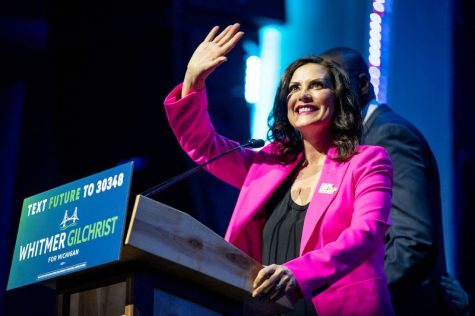Creating an organic, sustainable campus
Oakland University’s Student Organic Farm organization spoke about its future goals to further engage the university in creating sustainable campus living on Feb. 6 as well as the history of the SOF.
The event, Sustainability and Creativity Zone, featured several lectures and a free organic meal, which included organic produce from the school’s farm located at the corner of Adams and Butler road.
Dr. Fay Hansen, associate professor of biology and SOF’s adviser, said the purpose of the event was to lay out goals and ideas and strategize with those who are interested. She hopes for different academic organizations and departments, such as marketing and graphic arts, to utilize their different strengths to work to create that sustainability and creativity zone.
“The idea of the Sustainability and Creativity Zone is to engage students as stakeholders in shaping the activities and serving their needs,” Hansen said.
The farm has three abandoned chicken coops, that the SOF plans to remodel into sustainable structures that will work with the farm to serve the needs of the students.
Originally, Hansen wanted to see the coops remodeled into a co-op living area that would be maintained by students who would cook and grow their own food. The idea was denied, but Hansen and the SOF have other ideas for the coops, including an art studio and a licensed kitchen that would serve organic food.
“(The art studio) would be the creative version of the Rec Center,” Hansen said.
Since the university doesn’t allow students to prepare food, she suggested having a partnership with one of the culinary schools to create a cafe.
Many of the proposed ideas originated from the collaboration between Oakland University and Lawrence Tec in 2011 when Hansen contacted Joongsub Kim, associate professor and director of LTU’s Detroit Studio, about working on a grant proposal.
OU received a $25,000 STEM service learning grant from the Midwest Campus Compact. The grant funded grant partners, which were Lawrence Tech, The Michigan Young Farmers Association and the Baldwin Center.
Students address issues
Kim said students from his environmental psychology class investigated the farm in the spring of 2011, where they laid the foundation for his junior architecture design studio project for fall 2011.
“The junior design studio focused on developing the site design proposals and building design proposals for the three existing chicken coops on the study site,” Kim said.
The students addressed concerns such as sustainability, historic preservation, accessibility and more. Each of the 16 students arrived at a different conclusion, leaving many options for the SOF.
They hope the documentation will benefit Dr. Hansen’s next steps.
According to Kim, the students at the Detroit studio are currently documenting the results of the research, planning and design processes that directed last year’s design studio.
“We hope the documentation, when completed, will benefit Dr. Hansen’s next steps and also similar projects in the future,” Kim said.
Jared Bogdanov-Hanna, formerly the farm manager, said the farm has produced 2,000 pounds of produce in 25 varieties and offered over 100 students, faculty and staff an enriching education in urban farming this past year, along with providing fresh, organic produce to the Pontiac area. Another 1000 pounds was produced at the Baldwin Center’s Hoop House, a structure that allows gardening for 10 months of the year.
Season leads to expansion
“The 2011 season was extremely successful, with the SOF exceeding its goals of creating an educational center, a farm to school program, and support the food security and food sovereignty of the local community,” Bogdanov-Hanna said.
Bogdanov-Hanna, an OU alumnus, was the farm manager for 2011 before the grant expired. He said he still plans on being involved with the SOF, and shares similar goals with Dr. Hansen.
“We would also like to further develop a farm to school program with Chartwells, getting student grown organic produce into the dorms,” Bogdanov-Hannah said.
To learn more about the Student Organic Farmers or the Campus Student Organic Farm, contact Dr. Fay Hansen at [email protected], or the president of SOF, Danielle Bockart, at [email protected].
For more information on the Baldwin Center, a comprehensive human services agency, contact Alex Plum at [email protected].
Read more about the Michigan Young Farmers Association, a statewide non profit organization, visit their website at www.michiganyoungfarmercoalition.org
—-Contact senior reporter Jordan Gonzalez via email at [email protected]











